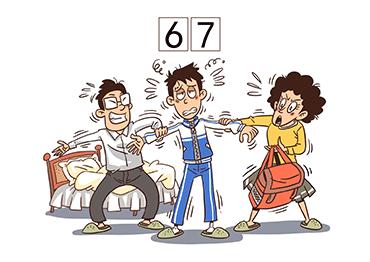• “As an 11th grader, I fully support two-day weekends. The current schedule is exhausting –we sleep less than six hours a night! Senior students only get two days off per month. Why do adults get weekends but students don’t? We’re not machines.”
• “This won’t truly help. As long as the gaokao remains unchanged, the rat race will continue.”
• “Under this new policy, students who lack self-discipline or access to private tutoring will fall behind even faster. But isn’t that fair? You reap what you sow.”
Source: Sina Weibo
Duan Xinxing, psychology professor, China University of Mining and Technology: “This 48-hour break each week marks a quiet but significant education revolution. Schools must learn to let go, families must take initiative in education planning, and students must become masters of their own time. The goal is to help students find their own balance between freedom and discipline.” Source: Huashang Daily
Chu Zhaohui, researcher, China National Academy of Educational Sciences: “A ‘passive personality’ has long been an issue among Chinese youth. Two-day weekends can help students reclaim their autonomy and the ability to take the initiative without constant external pressure.” Source: Chengdu Economic Daily
Zhang Xuefeng, influencer and extracurricular education expert: “If you’re a high school student, you’re probably thrilled. But if you’re a parent, you might feel anxious... Imagine this: Other parents are secretly hiring tutors for weekend lessons, and you don’t even know about it. Wouldn’t that make you uneasy?” Source: Zhang’s livestream on Douyin
Education authorities across China are enacting a landmark policy to restore two-day weekends for high school students. The move aims to alleviate some of the intense academic burden they endure in preparation for the grueling gaokao, the country’s national college entrance exam.
Hangzhou, Zhejiang Province has taken the lead, requiring high schools to grant 10th and 11th graders full weekends off starting in March 2025. Other cities, including Yangzhou and Nantong in Jiangsu Province and Changsha in Hunan Province, are expected to follow suit.
China officially began having two-day weekends for everyone on May 1, 1995. However, the rule was not strictly enforced in high schools. Most high schools operate on a six-day schedule, with some regions offering only one or two days off per month. The routine has taken a toll on students’ physical and mental health, prompting calls for reform.
Many netizens support the change, arguing that it eases students’ burdens and challenges neijuan, or China’s toxic culture of academic competition. “We are not test-taking machines,” students said online.
But some parents worry the policy will exacerbate educational inequality. Wealthy families can afford private tutoring on weekends, giving their children an edge, while students from lower-income backgrounds may struggle to keep up. Others fear that without structured school time, children will waste weekends glued to screens instead of studying.
Experts see the reform as a broader shift in China’s approach to education, shifting from producing high-performing test-takers to fostering creative, well-rounded individuals.

 Old Version
Old Version